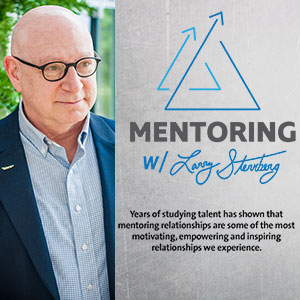Yesterday I realized I spend a good deal of time thinking about how to be a better mentor, and how to help others be better mentors. But I donât invest much time thinking about how to help people become better mentees. So Iâm going to give it a stab. For conceptual clarity my thoughts here apply to any sort of relationship in which youâre being coached, advised, mentored or taught by an individual outside a classroom on an ongoing basis. What a mouthful. Iâll use the word âmentorâ to stand for any of those types of relationships.
To begin, we must recognize that this is similar to asking, âHow can I become a better spouse?â or âHow can I become a better friend?â Itâs individualized. It depends on the unique needs of each person in the relationship. All this is MUCH easier if the two of you are a good natural fit in the first place. When the fit is good, youâll have to make fewer changes to become a better mentee for that person.
First principle: ask your mentor what he or she wants from you in this relationship. This might seem more formal than necessary, but itâll serve you both. Too often, in all sorts of relationships, expectations are not clarified, which leads to problems. If your mentor has important expectations that you canât or donât want to fulfill, best to find out as soon as possible. I have a close friend whoâs a high-powered attorney, dedicated to her career. When she married, she didnât know that her husband expected her to cook dinner for him every night, and to otherwise perform as would a non-working spouse. Tragically, it was a deal breaker for both of them.
Next, you actually have to take your mentorâs advice. As my wife says, âWhy buy a dog and bark yourself?â Sometimes the advice wonât intuitively seem like a good idea. âReally? You want me to do that?â When you have misgivings discuss them. But do it anyway. Do it despite your doubts. A good mentor will occasionally push you out of your comfort zone. If you reject your mentorâs advice too frequently, you should probably look for another mentor.
Next, donât act on advice from every well-meaning person. Suppose you hire a wellness coach. After learning about your goals and challenges, this coach will almost certainly recommend a program for you to follow. As you do this, youâll be bombarded â by well-meaning friends â with diverging and conflicting advice about the elements of your program. If you act on all this advice, you wonât be following a program whose elements have either internal consistency or harmony. You wonât make progress.
Iâve noticed in my career that a particular leaderâs decisions and actions create a certain internal harmony (harmony is different from consistency). As a consequence, there are behaviors or tactics that will work effectively for leader A but not for leader B. Acting on advice from too many different sources can easily destroy that harmony, preventing you from progressing.
This is not to discourage you from seeking different opinions, just as you might for a medical problem. My advice is to discuss with your mentor differing advice youâre receiving before you act. That way your decisions and actions will maintain both internal harmony and consistency.
Finally, express some appreciation. Appreciation from a mentee is among the most meaningful forms of recognition a mentor receives.
Thank for reading. Iâm sure thereâs much more to be said on this topic. As always, I welcome your thoughts.
Larry Sternberg
President
lsternberg@talentplus.com





